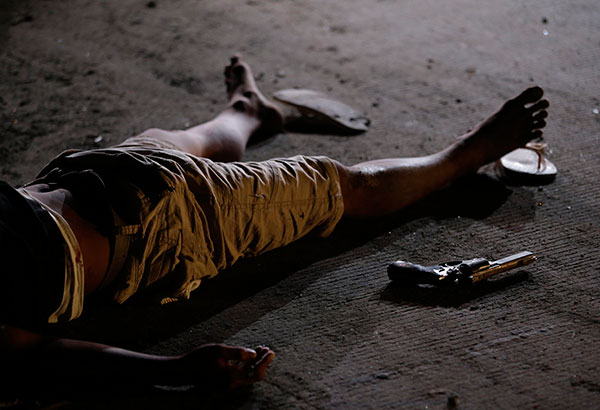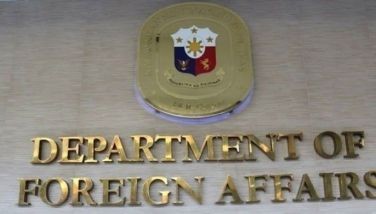Highlights from the Supreme Court oral arguments on the drug war

One of the fatalities, who has yet to be identified, was killed in an alleged shootout with police officers in Guiguinto, Bulacan on June 16. AP/Aaron Favila, file
MANILA, Philippines — The Supreme Court held three days of hearings, through oral arguments, on the petitions challenging the constitutionality of the drug war on November 21 and 28, and on December 4.
Two groups of petitioners are seeking a protection order from the high court over the ruthless killings of their loved ones and of people in their community.
Aside from the writ of amparo against the police, petitioners are also asking for the issuance of a temporary restraining order on the PNP's drug war operations.
Petitioners:
Aileen Almora asked the SC to stop extrajudicial killings that critics attribute to the nationwide war on drugs. Almora's brother, Ryan Dave, was killed in an anti-dug operation.
Rowena Appari's son was killed in a home invasion. Jefferson Soriano was shot several times, but survived.
They were represented by lawyer Chel Diokno of the Free Legal Assistance Group.
A second petition was filed by members of a religious order in San Andres Bukid, Manila, where 38 petitioners claim the existence of "systemic violence".
They were represented by Center for International Law.
Lawyer Rommel Butuyan faced the high court for the oral arguments.
Respondents:
The respondents in the petition are:
- Director General Ronald "Bato" Dela Rosa, Chief of the Philippine National Police
- Undersecretary Eduardo Año of the Department of Interior and Local Government
- Director General Aaron Aquino of the Philippine Drug Enforcement Agency
- Superintendent Joel Coronel, chief of the Manila Police District
- Other members of the PNP
Solicitor General Jose Calida represented the petitioners.
In his comment filed before the SC began oral arguments, the government's chief legal counsel said that the drug war is being "emasculated and undermined" by petitions of the families who lost their loved ones in the violent police operations.
He reiterated this statement before the high court and claimed the petitions are destabilization acts against the Duterte administration.
The court summoned Dela Rosa, Aquino, and Undersecretary Catalino Uy, as well as the other members of the police force and PDEA for the second day of the oral arguments
Central to the petitions are PNP CMC 2016-16 for the Project Double Barrel and the DILG memorandum circular 2017-112 on Masa Masid.
Here are some of the issues debated by the justices, petitioners and respondents:
Barangay list
Under the DILG "Masa Masid," a list of suspected drug users and sellers is drawn up from names put in a community drop box.
Senior Associate Justice Antonio Carpio raised: "The barangay chair can include his political enemies there?"
Butuyan said yes, since the list is submitted in confidence. He added that the residents would not know, except for some instances, about their names being included in the list.
Chief Justice Maria Lourdes Sereno also quizzed Calida on the list.
She asked: "Is the list subject to habeas data petition? If a person feels he is on the list, can he file a habeas data petition?"
The writ of habeas data is a remedy for any individual "whose right to privacy in life, liberty or security is violated or threatened by an unlawful act of any official or employee, or of a private individual or entity engaged in the gathering, collecting or storing of data or information."
Calida said that the government "will invoke national security," adding "there are certain matters like top secrets that cannot be divulged."
What does 'neutralize' in the memorandum mean?
The Execution section of the PNP memo states: "The PNP intends to equally address illegal drug problems in the barangays and at the same time pursue the neutralization of illegal drug personalities."
Diokno raised before the justices: "What we question is why they have to add the word negation... which has no counterpart in law."
"By its language, it can be construed by the officers on the ground to authorize killing that is not allowed in our system," Diokno also said.
Associate Justice Francis Jardeleza said: "You have a situation where a government circular contains vague terms which can be taken to mean as license to kill, and you are saying that is unconstitutional, yes?"
Diokno answered in affirmative.
Dela Rosa, during the third hearing of the consolidated petitions, told justices that he has never ordered his officers to kill anyone.
Verbal orders?
Senior Associate Justice Antonio Carpio started his interpellation of Calida on the third day of the hearing, remarking on several pronouncements by President Rodrigo Duterte telling the police to go ahead and kill drugs suspects. The justice asked if these orders, delivered in Duterte's trademark freestyle speeches, are guidance for the police.
Calida replied that he has no personal knowledge of the pronouncements and is not in place to answer the question.
Associate Justice Marvic Leonen, while grilling Calida, pointed out that the the memorandum explicitly states that it emanated from a verbal order from Duterte.
Listed as the first item of reference in the PNP memorandum is: "Pronouncement of President Rodrigo Duterte to get rid of illegal drugs during the first six months of his term."
Street peddlers vs. drug lord
Section 3 of the PNP memorandum circular on Oplan Double Barrel explicitly states that there are three transnational drug organizations operating in the Philippines.
"Chinese or Filipino-Chinese drug syndicates dominate the drug market in the country," the PNP memorandum stated. It added that these Chinese syndicates "facilitate production, manufacturing and bulk smuggling of dangerous drugs in the country."
Carpio, in his interpellation of Calida, asked if there have been Chinese or Filipino Chinese drug lords neutralized by the police since July 1, 2016.
Calida said 418 Chinese suspects have been arrested, stressing none have been killed.
Violations of rights
PNP's Operation Double Barrel pertains to two projects: Oplan Tokhang (house-to-house visitation) and Project High-Value Targets.
The justices asked the petitioners if the execution of the two orders violates the Bill of Rights.
Carpio asked Diokno: "When the police conduct case build up just because you refuse entry, that violates the right to privacy because you may refuse entry, correct?"
Diokno answered in the affirmative.
Leonen, meanwhile stated that the Oplan Tokhang setup violates the right against self-incrimination, right to custodial interrogation, and the right to domicile.
He also said that if threats are given to those who refuse entry to their residence, it may be violation of the anti-torture law.
Calida, however, stressed that the police, during visitation, only stay at the gates.
He added that if the residents refuse entry, the police will move to the next door.
Death investigation
Carpio ordered the solicitor general to submit the records of the 3,800 "deaths under investigation" that the police are looking into.
He asked the following information to be submitted with the memoranda:
- gender, ages of the killed
- place and time of operations
- name of police leader and members who participated
- pre-operations plan
- post-operation report
- whether search warrants or arrest warrants were issued
- names of the representatives issued
The Court allowed the parties to submit their respective memoranda 60 days from December 5, the last day of the hearings.
After the parties submit their memoranda, the case is deemed submitted for decision.
- Latest
- Trending































